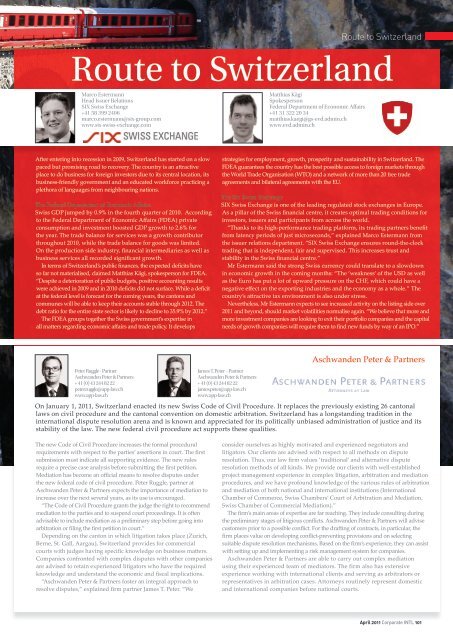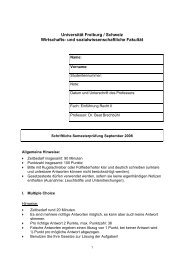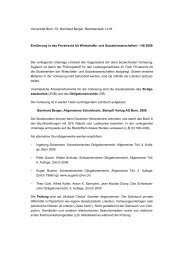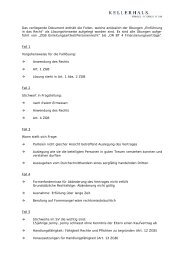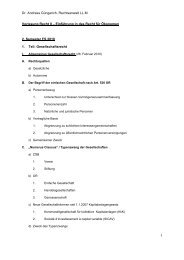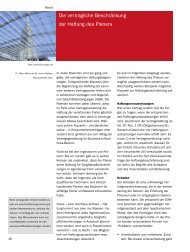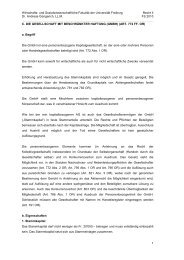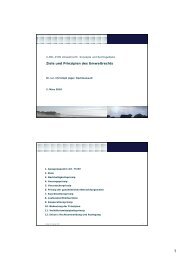Route to Switzerland
Route to Switzerland
Route to Switzerland
You also want an ePaper? Increase the reach of your titles
YUMPU automatically turns print PDFs into web optimized ePapers that Google loves.
<strong>Route</strong> Sec<strong>to</strong>r <strong>to</strong> <strong>Switzerland</strong> Panel<br />
<strong>Route</strong> <strong>to</strong> <strong>Switzerland</strong><br />
Marco Estermann<br />
Head Issuer Relations<br />
SIX Swiss Exchange<br />
+41 58 399 2406<br />
marco.estermann@six-group.com<br />
www.six-swiss-exchange.com<br />
After entering in<strong>to</strong> recession in 2009, <strong>Switzerland</strong> has started on a slow<br />
paced but promising road <strong>to</strong> recovery. The country is an attractive<br />
place <strong>to</strong> do business for foreign inves<strong>to</strong>rs due <strong>to</strong> its central location, its<br />
business-friendly government and an educated workforce practicing a<br />
plethora of languages from neighbouring nations.<br />
The Federal Department of Economic Affairs<br />
Swiss GDP jumped by 0.9% in the fourth quarter of 2010. According<br />
<strong>to</strong> the Federal Department of Economic Affairs (FDEA) private<br />
consumption and investment boosted GDP growth <strong>to</strong> 2.6% for<br />
the year. The trade balance for services was a growth contribu<strong>to</strong>r<br />
throughout 2010, while the trade balance for goods was limited.<br />
On the production side industry, financial intermediaries as well as<br />
business services all recorded significant growth.<br />
In terms of <strong>Switzerland</strong>’s public finances, the expected deficits have<br />
so far not materialised, claimed Matthias Kägi, spokesperson for FDEA.<br />
“Despite a deterioration of public budgets, positive accounting results<br />
were achieved in 2009 and in 2010 deficits did not surface. While a deficit<br />
at the federal level is forecast for the coming years, the can<strong>to</strong>ns and<br />
communes will be able <strong>to</strong> keep their accounts stable through 2012. The<br />
debt ratio for the entire state sec<strong>to</strong>r is likely <strong>to</strong> decline <strong>to</strong> 35.9% by 2012.”<br />
The FDEA groups <strong>to</strong>gether the Swiss government’s expertise in<br />
all matters regarding economic affairs and trade policy. It develops<br />
Peter Ruggle - Partner<br />
Aschwanden Peter & Partners<br />
+ 41 (0) 43 244 82 22<br />
peter.ruggle@app-law.ch<br />
www.app-law.ch<br />
On January 1, 2011, <strong>Switzerland</strong> enacted its new Swiss Code of Civil Procedure. It replaces the previously existing 26 can<strong>to</strong>nal<br />
laws on civil procedure and the can<strong>to</strong>nal convention on domestic arbitration. <strong>Switzerland</strong> has a longstanding tradition in the<br />
international dispute resolution arena and is known and appreciated for its politically unbiased administration of justice and its<br />
stability of the law. The new federal civil procedure act supports these qualities.<br />
The new Code of Civil Procedure increases the formal procedural<br />
requirements with respect <strong>to</strong> the parties’ assertions in court. The first<br />
submission must indicate all supporting evidence. The new rules<br />
require a precise case analysis before submitting the first petition.<br />
Mediation has become an official means <strong>to</strong> resolve disputes under<br />
the new federal code of civil procedure. Peter Ruggle, partner at<br />
Aschwanden Peter & Partners expects the importance of mediation <strong>to</strong><br />
increase over the next several years, as its use is encouraged.<br />
“The Code of Civil Procedure grants the judge the right <strong>to</strong> recommend<br />
mediation <strong>to</strong> the parties and <strong>to</strong> suspend court proceedings. It is often<br />
advisable <strong>to</strong> include mediation as a preliminary step before going in<strong>to</strong><br />
arbitration or filing the first petition in court.”<br />
Depending on the can<strong>to</strong>n in which litigation takes place (Zurich,<br />
Berne, St. Gall, Aargau), <strong>Switzerland</strong> provides for commercial<br />
courts with judges having specific knowledge on business matters.<br />
Companies confronted with complex disputes with other companies<br />
are advised <strong>to</strong> retain experienced litiga<strong>to</strong>rs who have the required<br />
knowledge and understand the economic and fiscal implications.<br />
“Aschwanden Peter & Partners foster an integral approach <strong>to</strong><br />
resolve disputes,” explained firm partner James T. Peter. “We<br />
James T. Peter - Partner<br />
Aschwanden Peter & Partners<br />
+ 41 (0) 43 244 82 22<br />
james.peter@app-law.ch<br />
www.app-law.ch<br />
Matthias Kägi<br />
Spokesperson<br />
Federal Department of Economic Affairs<br />
+41 31 322 20 34<br />
matthias.kaegi@gs-evd.admin.ch<br />
www.evd.admin.ch<br />
strategies for employment, growth, prosperity and sustainability in <strong>Switzerland</strong>. The<br />
FDEA guarantees the country has the best possible access <strong>to</strong> foreign markets through<br />
the World Trade Organisation (WTO) and a network of more than 20 free trade<br />
agreements and bilateral agreements with the EU.<br />
The Six Swiss Exchange<br />
SIX Swiss Exchange is one of the leading regulated s<strong>to</strong>ck exchanges in Europe.<br />
As a pillar of the Swiss financial centre, it creates optimal trading conditions for<br />
inves<strong>to</strong>rs, issuers and participants from across the world.<br />
“Thanks <strong>to</strong> its high-performance trading platform, its trading partners benefit<br />
from latency periods of just microseconds,” explained Marco Estermann from<br />
the issuer relations department. “SIX Swiss Exchange ensures round-the-clock<br />
trading that is independent, fair and supervised. This increases trust and<br />
stability in the Swiss financial centre.”<br />
Mr Estermann said the strong Swiss currency could translate <strong>to</strong> a slowdown<br />
in economic growth in the coming months: “The ‘weakness’ of the USD as well<br />
as the Euro has put a lot of upward pressure on the CHF, which could have a<br />
negative effect on the exporting industries and the economy as a whole.” The<br />
country’s attractive tax environment is also under stress.<br />
Nevertheless, Mr Estermann expects <strong>to</strong> see increased activity on the listing side over<br />
2011 and beyond, should market volatilities normalise again. “We believe that more and<br />
more investment companies are looking <strong>to</strong> exit their portfolio companies and the capital<br />
needs of growth companies will require them <strong>to</strong> find new funds by way of an IPO.”<br />
Aschwanden Peter & Partners<br />
consider ourselves as highly motivated and experienced negotia<strong>to</strong>rs and<br />
litiga<strong>to</strong>rs. Our clients are advised with respect <strong>to</strong> all methods on dispute<br />
resolution. Thus, our law firm values ‘traditional’ and alternative dispute<br />
resolution methods of all kinds. We provide our clients with well-established<br />
project management experience in complex litigation, arbitration and mediation<br />
procedures, and we have profound knowledge of the various rules of arbitration<br />
and mediation of both national and international institutions (International<br />
Chamber of Commerce, Swiss Chambers’ Court of Arbitration and Mediation,<br />
Swiss Chamber of Commercial Mediation).”<br />
The firm’s main areas of expertise are far reaching. They include consulting during<br />
the preliminary stages of litigious conflicts. Aschwanden Peter & Partners will advise<br />
cus<strong>to</strong>mers prior <strong>to</strong> a possible conflict. For the drafting of contracts, in particular, the<br />
firm places value on developing conflict-preventing provisions and on selecting<br />
suitable dispute resolution mechanisms. Based on the firm’s experience, they can assist<br />
with setting up and implementing a risk management system for companies.<br />
Aschwanden Peter & Partners are able <strong>to</strong> carry out complex mediation<br />
using their experienced team of media<strong>to</strong>rs. The firm also has extensive<br />
experience working with international clients and serving as arbitra<strong>to</strong>rs or<br />
representatives in arbitration cases. At<strong>to</strong>rneys routinely represent domestic<br />
and international companies before national courts.<br />
April 2011 Corporate INTL 101
Sec<strong>to</strong>r <strong>Route</strong> <strong>to</strong> Panel <strong>Switzerland</strong><br />
<strong>Route</strong> Sec<strong>to</strong>r <strong>to</strong> <strong>Switzerland</strong> Panel<br />
Deloitte - Transaction Services<br />
Konstantin von Radowitz<br />
Corporate Finance Partner<br />
+41 (44) 421 6457<br />
kvonradowitz@deloitte.ch<br />
www.deloitte.ch<br />
<strong>Switzerland</strong> is an attractive place <strong>to</strong> do business for foreign inves<strong>to</strong>rs<br />
due <strong>to</strong> its central location, its business-friendly environment<br />
and educated workforce who practice a range of languages from<br />
neighbouring nations. Swiss GDP was forecast <strong>to</strong> rise by 0.4% in 2010<br />
but unexpectedly jumped by 0.9% in the fourth quarter. The boost<br />
was partially due <strong>to</strong> an increase in exports of chemical products. The<br />
Swiss National bank predicts growth in 2011 <strong>to</strong> shrink <strong>to</strong> a moderate<br />
1.5 % after 2.6% in 2010. The positive emerging trends in the financial<br />
sec<strong>to</strong>r of the Swiss economy as well as the country’s low tax rate have<br />
led <strong>to</strong> a rise in foreign investments. The nation’s corporate tax rate is<br />
between 13% and 22% and, in accordance with the nation’s taxation<br />
laws, can be availed by any company that has its registered office or<br />
place of effective management in <strong>Switzerland</strong>.<br />
The M&A market is certainly reaping the benefits of <strong>Switzerland</strong>’s modest<br />
economic growth. Deal activity in the Swiss market seems <strong>to</strong> have picked<br />
up in the past two <strong>to</strong> four months, said Konstantin von Radowitz, corporate<br />
finance partner at Deloitte <strong>Switzerland</strong>. He said that current public<br />
offers suggest that the courage <strong>to</strong> do transactions is coming back.<br />
With the new increases in transactions comes a need for a multitude<br />
of financial and professional services <strong>to</strong> support these deals. The M&A<br />
Transaction Services Team at Deloitte <strong>Switzerland</strong> enable a deal’s maxi-<br />
Gloor & Sieger<br />
Oliver Rappold<br />
At<strong>to</strong>rney-at-law, LL.M.<br />
Partner<br />
+41 44 254 61 61<br />
orappold@gloor-sieger.ch<br />
www.gloor-sieger.ch<br />
mum value <strong>to</strong> be achieved by ensuring value drivers, risks and other price sensitive<br />
aspects are identified and properly assessed.<br />
The team’s transactional expertise is complemented by industry and functional<br />
experts from across Deloitte in areas such as tax, pension, accounting and<br />
IT. The team consists of specialists with a variety of backgrounds and industry<br />
expertise. They provide due diligence and M&A services <strong>to</strong> both corporate and<br />
private equity clients. The team also works closely with M&A tax, M&A strategy,<br />
operational and post-merger integration teams.<br />
Corporate finance partner Konstantin von Radowitz outlined how his team<br />
helps <strong>to</strong> maximise the value of an acquisition. “With our Vendor Assistance<br />
Services we support sellers in preparing their asset for sale in different relevant<br />
fields such as finance, financial and operational carve-out analyses, tax,<br />
pensions, IT, etc. by looking at the asset in a way a potential inves<strong>to</strong>r would<br />
look at them thereby helping <strong>to</strong> avoid value erosion throughout the deal.<br />
This may well lead in<strong>to</strong> a Vendor Due Diligence. On the buy side, we support<br />
buyers in the due diligence analysis again in various fields, depending on the<br />
respective transaction, such as finance, tax, pensions, IT, operational, post<br />
merger integration etc.”<br />
Mr von Radowitz said that he expects Swiss M&A market activity <strong>to</strong> continue <strong>to</strong><br />
pick up over the next 12 months. He also commented that the private equity and venture<br />
capital markets are quite calm. “The general understanding is that notable venture<br />
capital and buy-out transactions may well only come back in Q4 or 2012.”<br />
The Swiss real estate market did not experience the same exaggerations as other countries in recent years. Hence it has<br />
remained quite stable and fundamentally strong throughout the crisis. Consequently the construction sec<strong>to</strong>r has not seen an<br />
actual downturn with many players still running at their capacity limits and in the <strong>to</strong>p locations it is still a sellers’ market.<br />
Given these parameters and the fact that bank lending in<br />
<strong>Switzerland</strong> did not reach the leverage levels seen abroad, many of<br />
the projects were able <strong>to</strong> survive and new projects have commenced.<br />
Oliver Rappold, partner at Gloor & Sieger, said that the real estate fund<br />
industry has experienced a sharp increase in interest and projects over<br />
the last five years, in particular since the new law on collective investment<br />
schemes (KAG) has come in<strong>to</strong> force in 2007 which has introduced<br />
new fund vehicles and tax optimizations. “The Swiss Financial Market<br />
Supervisory Authority (FINMA) has, however, as a consequence of<br />
the global financial crisis increased the regula<strong>to</strong>ry hurdles since and is<br />
currently reluctant in approving further real estate funds.”<br />
Swiss construction regulation is based on statu<strong>to</strong>ry private and<br />
public law. Private law (Swiss Code of Obligations) deals with<br />
the relevant contracts such as work contracts, whereas public<br />
law provides for the building and planning provisions including<br />
environmental law and monument protection. Private law is mainly<br />
federal law whereas public law is <strong>to</strong> a substantial part within the<br />
authority of the can<strong>to</strong>ns and communities.<br />
In addition there is an extensive set of rules by the Swiss<br />
engineers and architecture association (SIA) on technical matters,<br />
safety etc. and standard agreements including general terms and conditions.<br />
Despite a great tradition of detailed and extensive statu<strong>to</strong>ry law, case law plays<br />
also an important part in the field of construction law.<br />
Mr Rappold said that while there have been no major legal developments in<br />
the industry recently which would materially affect building projects, there is<br />
a federal popular initiative pending <strong>to</strong> vote within the next two years which in<br />
case of its adoption would limit the possibility <strong>to</strong> declare new building zones.<br />
This may have a long term impact on the construction dynamic in <strong>Switzerland</strong>.<br />
“Furthermore, there are certain minor changes <strong>to</strong> statu<strong>to</strong>ry law in progress including<br />
changes with regard <strong>to</strong> property liens. In addition, there are efforts <strong>to</strong> introduce<br />
utilization restrictions and other measures in <strong>to</strong>urist areas in connection with the issue<br />
of ‘cold beds’ and the long awaited abolition of the federal law on restrictions of foreign<br />
ownership of real estate is still pending,” added Mr Rappold.<br />
When questioned about future predictions for the Swiss construction industry, Mr<br />
Rappold said opinions are divided. “Some claim over-heating in certain hot spots<br />
and a considerable risk of a correction. Others are more optimistic on the prospects<br />
of the industry. My personal opinion is somewhere in between: the fundamentals are<br />
still quite strong, though a more cautious approach <strong>to</strong>wards project developments, in<br />
particular in the field of residential apartments (for sale), seems advisable. A risk lies<br />
also in the his<strong>to</strong>rically low interest rates, should they rise unexpectedly steep.”<br />
Kellerhals - M&A<br />
Dr. Thomas Bähler - Partner<br />
Kellerhals<br />
+41 58 200 35 00<br />
thomas.baehler@kellerhals.ch<br />
<strong>Switzerland</strong>’s business environment is still unique in Europe in<br />
many ways: its economic success traditionally rests on its stability,<br />
its production technology and the quality of its products.<br />
These fac<strong>to</strong>rs are even more pertinent in the light of the Euro crisis,<br />
claimed Thomas Bähler, M&A specialist and partner at Kellerhals.<br />
“Furthermore, the inflation rate in recent years has constantly<br />
remained below 1% and, as a result, is considerably lower than in the<br />
EU and US. Interest rates in <strong>Switzerland</strong> have remained low. Against<br />
this backdrop, the IMD has rated <strong>Switzerland</strong> as the most competitive<br />
European country in its World Competitiveness Yearbook 2011.”<br />
The M&A activity in the healthcare and life science sec<strong>to</strong>rs have been<br />
particularly robust amid the economic downturn. The largest transaction<br />
last year was the acquisition of global medical company, Alcon, by Novartis<br />
International AG, a multinational pharmaceutical company based in Basel,<br />
<strong>Switzerland</strong>. The deal was valued at US$ 41.2 billion.<br />
“In contrast, it is the banking and finance industry that are<br />
facing profound challenges,” explained Dr. Bähler. “In view of new<br />
regulations requiring revisions of the traditional model of how<br />
private banking operates, we might look at increased M&A activity in<br />
this sec<strong>to</strong>r in 2011.”<br />
In comparison <strong>to</strong> other European economies, <strong>Switzerland</strong> managed<br />
<strong>to</strong> escape the most severe consequences of the crisis. UBS AG was<br />
the only Swiss Bank that needed <strong>to</strong> be bailed out by both the federal<br />
government and the Swiss National Bank. However, Dr. Bähler<br />
warned that the strong Swiss Franc against the Euro is a downside<br />
<strong>to</strong> the country’s robust economic outlook and the absence of deficit<br />
spending. Principally, the export-led Industrial Markets are suffering<br />
from the strong currency.<br />
Although <strong>Switzerland</strong> has a long tradition of openness <strong>to</strong>ward foreign<br />
inves<strong>to</strong>rs, some restrictions do exist regarding the acquisition of Swiss<br />
residential real estate and the acquisition of businesses in regulated<br />
industries such as banking, securities trading and insurance.<br />
The issue of competition law has become the main challenge <strong>to</strong> large-<br />
scale transactions in recent years. The Swiss Competition Commission<br />
seems <strong>to</strong> take a much <strong>to</strong>ugher and often unpredictable stand <strong>to</strong>ward<br />
merger activities, commented Dr. Bähler. “According <strong>to</strong> our experience it is<br />
crucial <strong>to</strong> get in <strong>to</strong>uch with the said anti-trust authority well before the deal<br />
is being closed in order <strong>to</strong> outline not only the legal fac<strong>to</strong>rs behind the deal,<br />
but first and foremost its business reasons.”<br />
The Swiss private equity market, which is only just picking up pace again,<br />
is likely <strong>to</strong> play a much bigger role in terms of deal funding for the remainder<br />
of 2011. According <strong>to</strong> Dr. Bähler this is due <strong>to</strong> the fact that after the severe<br />
shock during the financial crisis, the industry has <strong>to</strong> show activities <strong>to</strong> gain<br />
new funds given the many attractive targets in the current market.<br />
Dr. Bähler also mentioned the increasingly important presence<br />
of the emerging markets that are attractive <strong>to</strong> inves<strong>to</strong>rs because of<br />
the strong Swiss Franc. On the other hand companies from markets<br />
such as China and India are demonstrating an increased readiness <strong>to</strong><br />
invest in Swiss companies.<br />
Although <strong>Switzerland</strong> is not a member of the EU, nationals of most<br />
of the EU member states are entitled <strong>to</strong> work in <strong>Switzerland</strong>.<br />
<strong>Switzerland</strong> is a privileged place for launching a business, not only because<br />
of its geographical situation in the middle of Europe, its attractive tax and<br />
banking systems, its highly qualified workforce or of its matchless quality<br />
of life, but also because its employment law is very liberal and flexible in<br />
comparison with neighbouring jurisdictions. It guarantees an adequate<br />
minimum employee protection through a number of compulsory provisions,<br />
beyond which the parties are free <strong>to</strong> negotiate their employment relationship<br />
as they wish. As an example, the payment of an indemnity by the employer is<br />
not a condition of validity of a prohibition of competition.<br />
Although workers’ unions play an important role in the negotiation of<br />
collective agreements, only 20% of the workers are members of such unions.<br />
Strikes are only allowed as ultima ratio and are therefore rare.<br />
Fixed-term employment relationships end without notice, while<br />
employment relationships for unlimited periods may be terminated by either<br />
party, unless otherwise agreed, with seven days’ notice during the probation<br />
period which can be extended up <strong>to</strong> three months, a one month’s notice<br />
during the first year of service, a two months’ notice until the ninth year of<br />
employment and a three months’ notice thereafter.<br />
According <strong>to</strong> the liberal principle of the freedom of termination,<br />
justification is not required. A termination may be considered as abusive<br />
in specific circumstances, which have been interpreted rather broadly<br />
in the recent case law. However, even if a termination is considered as<br />
abusive, it is still valid. The employee has no right <strong>to</strong> be reintegrated<br />
and can merely claim for compensation up <strong>to</strong> a maximum amount<br />
corresponding <strong>to</strong> six months’ wages. A notice of termination is only void<br />
if it is given by the employer at an inopportune juncture, such as during<br />
compulsory service, illness or pregnancy.<br />
Both employer and employee may at any time terminate the employment<br />
relationship with immediate effect (without notice) for good cause, i.e.<br />
if particular circumstances render the continuation of the employment<br />
relationship in good faith unconscionable for the party giving notice. If<br />
the termination with immediate effect is unjustified, it remains valid,<br />
but the employee can claim for compensation up <strong>to</strong> a maximum amount<br />
corresponding <strong>to</strong> six months’ wages.<br />
In the case of restructurings (mergers, spin-offs, transfer of<br />
undertakings) and mass redundancies, the employees or their<br />
representatives and the can<strong>to</strong>nal employment offices have information<br />
and consultation rights, but they do not have co-determination rights<br />
and the employer has no obligation <strong>to</strong> set up a social plan.<br />
Swiss corporate law has recently been amended with transparency<br />
rules on compensation of board members and senior management of<br />
listed companies.<br />
Python & Peter - Employment Law<br />
Jérôme Nicolas<br />
+41 22 702 15 15<br />
jnicolas@pplex.ch<br />
www.pplex.ch<br />
Python & Peter has offices in Geneva, Lausanne, Bern, Sion, Zug, Brussels<br />
and Tokyo with more than 65 at<strong>to</strong>rneys, all highly qualified and fluent<br />
in several languages. We offer <strong>to</strong> both private and institutional clients in<br />
<strong>Switzerland</strong> and abroad high quality services in all areas of the law, with<br />
particular emphasis on business law, including employment law.<br />
102 Corporate INTL April 2011 April 2011 Corporate INTL 103


